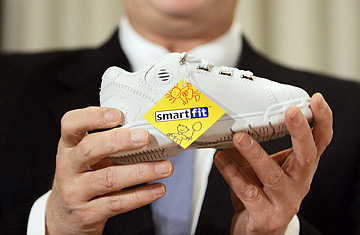
Former Chairman of the Consumer Product Safety Commission Hal Stratton displays a children's shoe that has been recalled.
But Baroody is not a corporate insider — he's a Washington insider. And he's not a businessman — he's a business lobbyist. Those may sound like irrelevant distinctions, but they're critical to understanding the Bush Administration, where energy lobbyists oversee mining and drilling, timber lobbyists oversee logging, hospital and pharmaceutical lobbyists oversee health, and the National Cattlemen's Beef Association practically transferred its staff to the Department of Agriculture.
These are Washington people, not corporate people. They know how to make legislation, not payroll. They're insider hens who made their livings working for foxes, and learning how the henhouse really works. In 2004, the Denver Post found more than 100 top Bush appointees regulating industries they used to represent as lobbyists or lawyers. And that didn't include former quasi-lobbyists like Vice President Cheney, who became a Fortune 500 CEO because Halliburton wanted a Washington hand to expand its access to government contracts.
Predictably, government-by-lobbyist has produced some scandals. Philip Cooney, an oil lobbyist who worked in the White House, got caught editing the science out of global warming reports; he's now back at ExxonMobil. Steven Griles, an energy lobbyist who became deputy interior secretary, was a one-man extraction-industry conflict-of-interest machine at Interior; the inspector general described his tenure as an "ethical quagmire," and he's now awaiting sentencing in the Jack Abramoff lobbying scandal.
Baroody isn't that kind of guy. He's a policy wonk whose father founded the American Enterprise Institute think tank; he ran his own Republican think tank in the early 1990s before he was ousted for insufficient partisanship. His friends say the fox-in-the-henhouse caricature distorts a public-minded family man with 19 grandchildren. "Do you have a friend you'd trust with your child, or your grandmother?" said Dennis Whitfield, who served with Baroody in President Reagan's Labor Department. "For me, that's Mike Baroody. You think he's not concerned about the safety of his own grandkids?"
Still, at NAM, Baroody has fought to shield manufacturers from safety claims and fines over products ranging from asbestos to tobacco. That is, of course, his job. Most of the Administration's former lobbyists haven't broken any rules; they've just sided with industry against consumer activists and environmentalists. That's their job. Hiring a NAM lobbyist to oversee consumer safety regulation is a bit like letting a child set his own bedtime. It's only a problem if you expect enforcement.
The capitalist ideal is free markets and level playing fields; the lobbyist ideal is influencing the levers of power to help clients. In the Bush Administration, lobbyists control those levers of power, and use them to provide corporate welfare, tax breaks, access to public land, and other big-government goodies to friends in pro-Republican industries. Baroody knows how to work those levers; he's worked in the Washington henhouse since 1970, and he's intimately familiar with the CPSC. Consumer activists had called him "totally unqualified," but they're breathing easier today because they know he's just the opposite.
